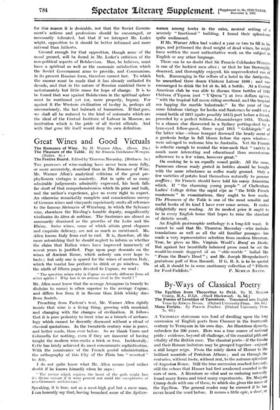Great Wines and Good Victuals
The Festive Board. Edited by Thurston Macaulay. (Methuen. 5s.) THE processes of wine-making have never been more fully, or more accurately, described than in The Romance of Wine. Mr. Warner Allen's analytical criticism of the great pre- phylloxera vintages is masterly. But in spite of so many admirable judgements admirably expressed, his book falls far short of that comprehensiveness which its price and bulk, and the author's experience, give us every right to expect. An otherwise remarkably complete and conscientious survey of German wines and vineyards capriciously omits all reference
to the famous Steinwein of Wiirzburg, in which the Sylvaner vine, elsewhere the Riesling's humble deputy, magnificently vindicates its litres de noblesse. The Sauternes are almost as summarily dismissed as the growths of the Loire and the Rhone. Swiss wines, some of which attain great elegance and exquisite delicacy, arc not so much as mentioned. Mr. Allen knows Italy from end to end. It is, therefore, all the more astonishing that he should neglect to inform us whether the claim that Italian wines have improved immensely of recent years is justified. Page upon page descants on the wines of Ancient Rome, which nobody can ever hope to taste ; but only one is spared for the wines of modern Italy, which the tourist has perforce to drink or go wineless. On the ninth of fifteen pages devoted to Cognac, we read :
" The question arises why is Cognac so utterly different from all other spirits ? Why has it no serious rival in the world ? "
Mr. Allen must know that the average Armagnac (a brandy he disdains to name) is often superior to the average Cognac, and differs less from it in flavour than Irish whisky does from Scotch.
Preaching from Pasteur's text, Mr. Warner Allen rightly insists that wine is a living thing, growing with mankind, and changing with the changes of civilization. It follows that it is pure pedantry to treat wine as a branch of archaeo- logy which cannot be decently discussed without a ritual of classical quotations. In the twentieth century wine is purer, and better made, than ever before. So we thank Marro and Columella for nothing, even if they are innocent of having taught the Modern wine-cooks a trick or two. Incidentally, Cette has lately achieved its most consummate sophistication.
With the connivance of the French postal administration the orthography of this City of the Plain has " reverted " to Sete.
I do not quite know what Mr. Allen means (and rather doubt if he knows himself) when he says :
" Tho nectar which rejoices the heart of the gods might lose its divine savour if it were poured out amid the cacophonies of neo-Germanic architecture."
Speaking, it is true, not as a most-high god but a mere man, I can honestly say that, having broached some of the 4i/zeta- namen among hocks in the calm, neutral setting of a severely " functional " building, I found their splendourg quite undimmed.
If Mr. Warner Allen had waited a year or two to fill in his gaps, and jettisoned the dead weight of dead wines, be might have written the most authoritative work on the subject in English or any -other language.
There can be no doubt that Sir Francis Colchester-Weinyas is one of the luckiest men alive ; or that he has thoroughly deserved, and thoroughly enjoyed, his unprecedented run of luck. Rummaging in the cellars of a hotel in the Antipodes, he unearthed three dozen Chateau Latour 1899 ; and was encouraged to drink the lot at 4s. fkl. a bottle. At a Central _ American club he was able to discuss three bottles of 1921 Chateau d'Yquem (not " Y'Quein ") at two dollars apiece, " with the tropical full moon riding overhead, and the tropical sea lapping the marble balustrade." In the year of that same fabulous vintage for hocks and Sauternes he could set a sound bottle of 1817 (quite possibly 1815) port before a friend, preceded by a perfect Schloss Johannisberger 1834. Thanks to, a chance clue discovered in a Sydney potting-shed by a lynx-eyed fellow-guest, three regal 1911 " Goldsiegels " of the latter wine—whose bouquet drowned the heady scent of a gardenia hedge in full bloom before the open window— were salvaged to welcome him to Australia. Yet Sir Francis - is eclectic enough to remind the wine-snob that " variety is much more interesting and educational than monotonous adherence to a few wines, however great."
On cooking he is an equally sound guide. All the same, Parmesan cheese ready grated in bottles should be bought with the same reluctance as coffee ready ground. Only a few varieties of potato lend themselves naturally to pommes soufflies ; Sir Francis should have told his many Aramintas which. If " the charming young people " of Cheltenham Ladies' College define the sapid cape as " the little French
mushroom " in examinations, they ought to lose marks. The Pleasures of the Table is one of the most sensible and
useful books of its kind I have ever come across. It makes delightfully racy reading. At its modest price it ought to be in every English home that hopes to raise the standard of dietetic revolt.
An English gastrosophic anthology is a long-felt want. It cannot be said that Mr. Thurston Macaulay—who includes translations as well as all the old familiar passages—has made a very representative selection from modern literature. True, he gives us Mrs. Virginia Woolf's Boeuf en Daube.
But against her beautifully balanced prose must be set the would-be-comic doggerel of an " olde-worlde " ballad like " From the Boar's Head " ; and Mr. Joseph Hergesheimer's gratuitous puff of Ron Bacardi. If G. B. S. is to be quoted at all, it should be in some cautionary collection of " Filberts










































 Previous page
Previous page